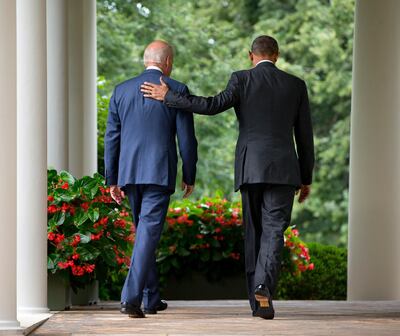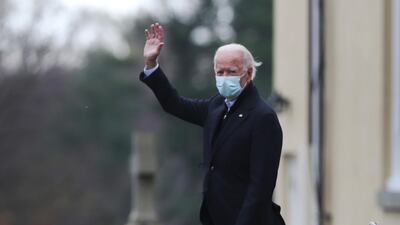Now that Joe Biden has emerged the winner of the 2020 US presidential elections, despite the protests of the incumbent Donald Trump, speculation is rife over who will emerge as leaders of his administration, particularly in foreign policy.
While any president is mandated primarily to tackle internal challenges, this will be especially true for President-elect Biden. He will be dealing with the need to contain Covid-19, especially as the US now has had more than 11.1 million cases and 264,000 deaths, along with millions economically impacted.
When it comes to foreign policy, multilateralism and economic co-operation will be crucial. And while Mr Biden has clear policies on championing multilateralism and a number of other issues – including a return to the Paris climate agreement – other policies remain unclear. Particularly when it comes to his approach to the Middle East. Beyond his commitment to renegotiating a nuclear deal with Iran, little is known about how Mr Biden will steer his policies in the region. Some speculate that the new administration will build on the legacy of Barack Obama, as Mr Biden played an active role as his vice president. However, one thing is certain: the world Joe Biden and his administration will inherit is markedly different from the one with which Barack Obama finished his presidency.

Mr Biden will come into office as the Arab world marks the end of a tumultuous decade since the start of the Arab uprisings. While internal dynamics, local government decisions and regional alliances played central roles in how those uprisings unfolded and ended, the American role was of great significance.
The term “leading from behind” was used to describe the US approach to Libya, as the superpower shyly led the coalition to remove Muammar Qaddafi with no plans for the “day after”. In Syria, the now-famous walk back from the “red line” of the use of chemical weapons allowed Syrian President Bashar Al Assad and his allies to quell the uprising there. Continued lukewarm American support for the opposition, however, meant that internal strife went on for years without a resolution. Furthermore, it was during Mr Obama’s first year in office that the Iran also witnessed an uprising, the leaders of which remain under house arrest to this day.
In Iraq, Mr Obama was clear on his disengagement from the country, handing oversight of developments there to Mr Biden. Numerous sources confirm that it was Mr Biden who supported a new term for Nouri Al Maliki as Iraq’s prime minister in 2010, even though the non-sectarian, nationalist list of Ayad Allawi won a larger number of seats in the elections. Mr Biden and his allies in government were keen to support Mr Al Maliki, believing a politician who claims to represent a sectarian majority was more representative for Iraq. The sectarian prism in approaching Middle Eastern politics, adopted largely under the presidency of George W Bush and continued under Mr Obama, led to major divisions in the region. It has been damaging to both the region and to America’s standing there. A focus on sovereign, state-led relations ought to replace one on sectarianism.

During Mr Trump’s presidency, less emphasis was given to sectarian and internal divisions the Middle East, with a renewed focus on national interests and how they would fit in with American interests. That is one direct method that many in the region support and seek to continue.
While 10 years is too brief a timespan for a historical take on what happened in Syria, Egypt, Libya, Yemen and beyond, it has represented a lifetime of events for the people in the Middle East. Just like hopes and dreams have been dashed in countries like Syria, Libya and Yemen, so too have hopes in the role that the US can play in the region.
Some American officials believe that Arab and regional expectations of the US are unrealistic. That may be so. But the US continues to have unparalleled influence. Mr Biden and those working on his foreign policy agenda must understand how this region has changed, particularly in 2020.
The most high-profile and possibly strongest Iranian military leader was killed on January 3 of this year by an American drone strike, putting Iran on the back foot for the first time. The killing of Quds Force commander General Qassem Suleimani did not lead to renewed sectarian strife. Rather, it led to further pressure on sectarian entities.
A government in Iraq was formed beyond sectarian dogma and the Shia-Islamist Dawa party no longer controls the office of the Prime Minister. Lebanon is on the brink of economic collapse, but Hezbollah and its Amal supporters have now accepted entering into talks with Israel.
The concept of deterrence in the region has changed, as has the idea of peace, with the signing of the Abraham Accords. All this at a time that countries across the region are grappling with economic stresses, demanding better governance and competence.
Officials in the Arab world are quite clear-eyed on the pressing issues that Mr Biden will face when he gets to the White House – and realise that there are no silver bullets from Washington. But America’s approach and actions, especially in the first few weeks of the new administration, will be of utmost importance. Understanding the realities on the ground, rejecting sectarianism as an organising principle for the region and working with countries responding to the needs of their people will require clear signals and diplomacy.
Mina Al-Oraibi is editor-in-chief of The National


